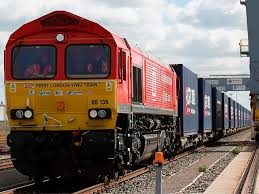The first-ever freight train from Britain to China started its mammoth journey on Monday along a modern-day “Silk Road” trade route as Britain eyes new opportunities after it leaves the European Union.
The 32-container train, around 600 metres long, left the vast London Gateway container port laden with whisky, soft drinks and baby products, bound for Yiwu on the east coast of China.
It was seen off on its 18-day, 12,000-kilometre journey with a string quartet, British and Chinese flags, and speeches voicing hope that it will cement a new golden age of trade between the two countries as Brexit negotiations loom.
The first train from China to Britain arrived on January 18, filled with clothes and other retail goods, and Monday’s departure was the first journey in the other direction.
The rail route is cheaper than air freight and faster than sea freight, offering logistics companies a new middle option.
After the last three containers were lifted onto the wagons, the driver gave a thumbs-up and tooted his horn as he got the train rolling at the port in Stanford-le-Hope, east of London.
“Restoring the ancient Silk Road as a means by which China, north Europe and now the UK can exchange goods is an important and exciting initiative,” said Xubin Feng, the chairman of Yiwu Timex Industrial Investment, which is co-running the service. “We have great faith in the UK as an export nation and rail provides an excellent alternative for moving large volumes of goods over long distances faster.”
The train will go through the Channel Tunnel before travelling across France, Belgium, Germany, Poland, Belarus, Russia and Kazakhstan before heading into China.
The containers, which also contain vitamins and pharmaceutical products, will be taken off and put on different wagons as they leave Poland, as the former Soviet Union countries use a wider rail gauge.
The containers switch back to standard gauge wagons at the Chinese border, an operation that typically takes around two hours. Boosting trade with China is a top priority for Britain as it leaves the EU and becomes free to strike its own trade deals. London was hailing the first export train as part of its “global Britain” plan, recalibrating its post-EU trading outlook.
Rupert Soames, Prime Minister Theresa May’s business ambassador for infrastructure and transport, said that the new route was “positive and timely”.




